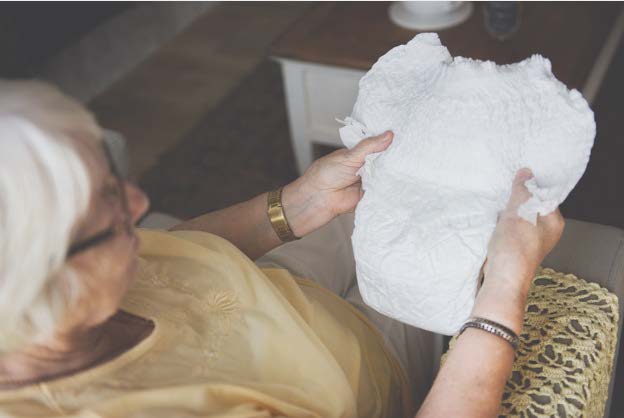Table of Contents
Last Updated on October 15, 2022
Managing Urinary Incontinence in Public Settings
What is Urinary Incontinence?
Urinary Incontinence (UI) which refers to loss bladder control, is a common health concern specifically among our senior population. In a recent study The Official Foundation of the American Urological Association found that approximately one third of men and women suffer from urinary incontinence. It is estimated, globally 50% people who suffer from UI do not treat their condition, causing them to frequently run to bathroom or avoid social outings all together. As accidents often occur at the most uncomfortable of times, one’s who suffer from urinary incontinence often take precautionary measures by using adult diapers. The use of adult diapers and briefs offers peace of mind to those suffering from UI, allowing one to continue to with their day to day life without fear of evident leakage. The sense of relief a diaper or brief can provide to a person who is experiencing UI is overwhelming, as it is estimated that over ten million adults throughout North America wear adult diapers.
Urinary incontinence is considered a symptom, from a variety of larger health concerns. Women on average are twice as likely to experience urinary incontinence and can often result from childbirth, menopause and surgery. In fact, the University of California revealed a year after childbirth 5% of women still experience incontinence. Men on the other hand, experience the symptom of UI from prostate removal, an overactive bladder and nerve damage. As UI results from a variety of health conditions, it is also important to note the psychological impact that UI can create. People who experience urinary incontinence may also suffer from depression, anxiety and grief. The relation between urinary incontinence and negative psychological effects is clear, as one may feel their quality of life has decreased. People who experience UI often worry about going out in public and an accident striking with no washroom insight or, having to abruptly leave from a social gathering to race to the washroom.
Managing Urinary Incontinence in Washrooms


In a recent publication from Stanford Health, Rachel Hayes* addressed the societal struggles of dealing with incontinence and changing her diaper in public. Rachel highlighted “A large amount of urine means changing [my] pads and finding a discreet place to dispose of an adult-sized diaper. I always have this anxiety, which doesn’t add to my social charm.” The Future of Urinary Incontinence
Adult diapers and briefs were designed to be a solution to urinary incontinence, alleviating any associated stress UI may bring to one’s social life. Instead, a new stress for those who experience UI has been created through the disposal of adult diapers. Urinary Incontinence affects individuals of all age groups although, more commonly experience by females and elder adults. A study conducted by the US National Library of Medicine highlighted that the percentage of elder adults 85+ plus will jump from 10% to 19% by 2040. This means as a significant portion of our population ages into senior years, urinary incontinence will also increase.
With the distress UI can bring individuals increasing due to population age, it is important to consider what can be done to improve washrooms and facilities to accommodate a large portion of our population who experience UI. Citron Hygiene has always been an advocate for proper sanitary disposal, and diapers are no different. Citron is proud to support proper diaper disposal throughout all public bathrooms, as people deserve the right to use the bathroom without judgement. Diaper and briefs disposal not only breaks the stigma that many people with incontinence experience, but also provides a hygienic and sanitary disposal method that accommodates other patrons and employees of the washroom.
Citron Hygiene’s adult diaper disposal service is available throughout all locations and can be set to a frequency that fits your business’s needs. The need for healthy and hygienic public bathrooms has always been a movement supported by Citron.
Photo source: www.freepik.com
*Name changed for confidentiality
Related posts:
- Why Elevate Your Washroom Experience (work)
- Preparation Makes Businesses Safer
- Why Employee Retention Matters
- Summertime is Maintenance Time
- Citron Certified Technicians: The gold-standard in facility hygiene services
- The List You Don’t Want Your Public Washroom To Be On – A Case Study of Horrible Washroom Experiences
- The Benefits of Citron Complete
- Opening a New Restaurant? Read this first!
